March
By Geraldine Brooks ’83JRN
With six novels all focused on different historical figures — from the Biblical King David to an English housemaid during the Great Plague of London to the first Native American to graduate from Harvard — Brooks is truly a master of the genre. March, the winner of the 2006 Pulitzer Prize for Fiction, retells Louisa May Alcott’s classic Little Women from the perspective of the girls’ father, an abolitionist who leaves his family to serve as a chaplain in the Union Army. It’s an inspired twist on a beloved story, and also a riveting indictment of the everyday cruelties of the Civil War.
Everyone Knows Your Mother Is a Witch
By Rivka Galchen ’06SOA
In her 2021 novel, Columbia creative writing professor Rivka Galchen tells the true story of Katharina Kelper, a healer and herbalist (and mother of famed astronomer Johannes Kelper) persecuted for witchcraft in early seventeenth-century Germany. Actual evidence against Katharina is slim, but that makes no difference to a self-righteous community hell bent on suppressing a strong, independent woman. Like Arthur Miller’s The Crucible, Galchen’s novel makes no overt connections to the present day, but the book’s message is clear and sadly still applicable.
The Paris Bookseller
By Kerri Maher ’04SOA
While Kerri Maher’s four novels all imagine the inner lives of real women in history, some are fresh takes on celebrities (Grace Kelly), while others shine a spotlight on lesser-known figures. In her bestseller, The Paris Bookseller, Maher puts herself in the shoes of Sylvia Beach, founder of Paris’ famed English-language bookstore Shakespeare & Co. The novel focuses on the 1920s, when the store was a haven for “The Lost Generation,” Paris’s bustling pack of ex-pat writers. Beach makes a pair of risky decisions that come to shape her life: she enters a romantic relationship with another woman, and she publishes a controversial novel called Ulysses. Book lovers will swoon over all the literary Easter eggs, and will relish the surprisingly spicy origin story of one of the twentieth century’s most famous novels.
The Women in the Castle
By Jessica Shattuck ’01SOA
Jessica Shattuck’s 2017 bestseller looks at World War II from a perspective not often explored: ordinary Germans, caught in a conflict they may not have supported. Her three protagonists are widows of resistance fighters – who were killed in an attempt to assassinate Hitler — trying to piece their lives back together and raise children in post-war Germany. The subject had personal resonance for the half-German Shattuck, who spent a summer interviewing her grandmother, a former member of the Nazi party, about how she and her fellow citizens were swept up in such a movement.
Loot
By Tania James ’06SOA
Tania James’s third novel, a finalist for the 2023 National Book Award, begins in late 18th century India, when ruler Tipu Sultan commissions a young wood carver named Abbas to build an elaborate toy as a present for his sons. War breaks out, the Sultan dies, and the Brits seize the toy and bring it back to Europe — leading Abbas to embark on a meandering, fifty-year quest to get it back. James weaves in important questions about class, race, religion, and colonialism, but there’s also plenty of adventure, romance, and fast-paced fun to keep the pages turning.
The Beach at Summerly
By Beatriz Williams ’99BUS
It is the summer of 1946, and the wealthy Peabody family has gathered at Summerly, their New England seaside resort, for the first time since the war ended. The caretaker’s daughter, Emilia Winthrop, spent the war years caring for her ailing mother and yearns for a life beyond the resort — especially after the arrival of a worldly relative who encourages Emilia’s dreams. But then an FBI agent shows up, with news that has tragic implications for the Winthrop and Peabody families alike. Best-selling novelist Beatriz Williams combines juicy romance, heart-pounding suspense, and fascinating period detail to create a perfect summer read.
We Must Not Think of Ourselves
By Lauren Grodstein ’97CC, ’01SOA
During some of the darkest days of World War II, a group of Jewish prisoners living in the Warsaw Ghetto founded the Oneg Shabbat project, an oral history archive that documented their experiences so that history would not forget. Lauren Grodstein’s 2023 novel is narrated by one of the archivists — a fictional former schoolteacher named Adam Paskow recruited to conduct interviews. It’s hard to find hope in a setting as bleak as this, but Grodstein’s novel is imbued with it, telling the family stories and romances that persisted in the ghetto against all odds.
The Address
By Fiona Davis ’00JRN
If walls could talk, they might sound a lot like Fiona Davis, who uses her novels to imagine the stories lurking behind some of New York City’s most famous buildings. In her bestseller The Address, she focuses on the iconic Dakota, imagining the lives of both a housekeeper who has an affair with architect Theodore Camden in the 1880s and, a century later, Camden’s granddaughter Bailey, who is renovating one of the building’s famous apartments. The Dakota is hardly unchartered territory in pop culture, but it’s fun to imagine its early years, when Central Park was brand new and the Upper West Side full of farmland.



